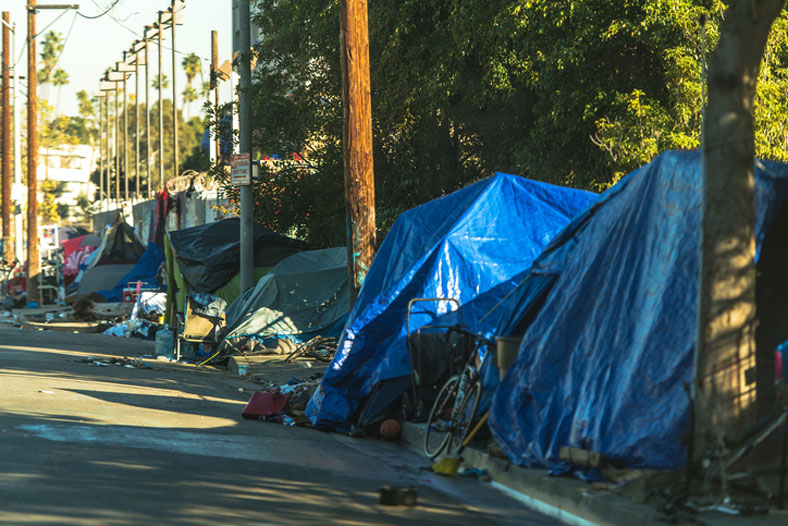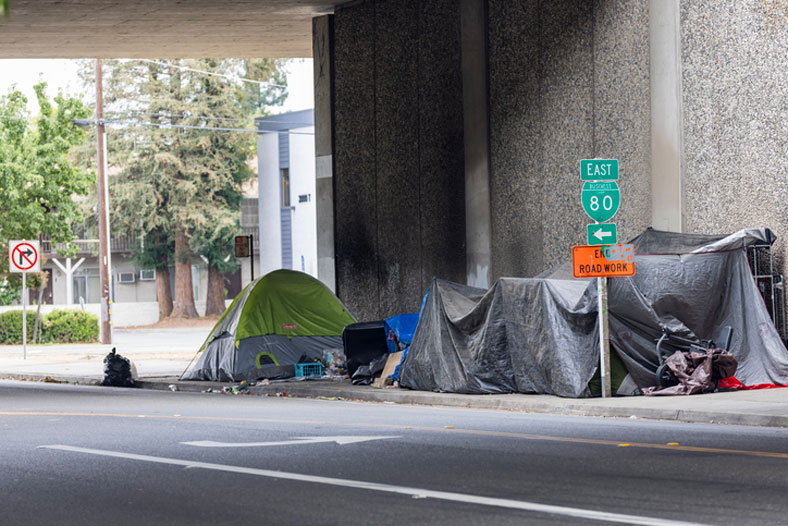Written by Jack Levinson

More than ever, Americans are aware of the homelessness crisis, a tragic phenomenon that is affecting communities in cities all over the country. For those looking to make a lasting difference in the lives of homeless individuals, the field of social work is the perfect arena to invest your efforts.
Social workers can play a powerful role in finding supportive services for homeless individuals and families, helping facilitate access to immediate services as well as the tools to end cycles of extreme poverty.
Most social workers involved in the homelessness crisis are focused on the on-the-ground supportive services that homeless individuals need immediately, or to make big investments in their future in the long term. Other social workers are involved in advocacy and reform efforts to improve the circumstances that have left so many people displaced and without homes. In short, there are many ways social workers can help the homeless, and motivated social workers will be able to find the path that suits their particular interests and aptitudes.
The Homeless Crisis in the U.S. Today
According to the Government Accountability Office, an independent watchdog organization that works directly with the U.S. Congress, over 580,000 people experienced homelessness in the U.S. in 2022, a sobering number that reflects the breadth of the homelessness crisis. Though the U.S. Department of Housing and Urban Development reports declining trends of rising homelessness, it also reports an increase in homelessness for individuals, people with disabilities who experience long-term homelessness, and people in unsheltered settings.
There are many factors that lead individuals to become homeless, including the following:
- Rising costs of living and housing
- Chronic unemployment
- Mental illness and disability
- Health issues and physical disabilities
- Substance abuse and addiction
- Escaping abusive situations
- Racial inequality
As you can see, many of the challenges homeless individuals face are related to factors beyond their control. Social service organizations work to fill in the gaps in our society to help those individuals and families overcome their challenges, regain their footing, and start fulfilling, rewarding lives.
Homelessness Prevention and Intervention in Social Work
Social workers have long focused on the needs of homeless individuals, as poverty reduction and improved access to opportunities for disadvantaged people have long been a central concern of the field as a whole. This means a multi-pronged approach to addressing homelessness, from ameliorating the hardships faced by unhoused people to helping those who are at risk of homelessness get their lives back on track.
Micro-Level Social Work and Homelessness
The role of social work in homelessness can look like many different things. Most people who work in the field begin their careers at the micro level – that is, working on the ground to help individuals and families address issues that can be life-threatening.
Social workers focused on homelessness can be responsible for incredible positive transformations in the lives of society’s most vulnerable.
Working at this level, some of the top responsibilities of social workers in the field can include the following:
- Helping homeless individuals and families find short-term and long-term housing
- Assisting unemployed people find work and subsidies
- Connecting unhoused people with healthcare needs to providers and clinics that can help them in the long run
- Providing counseling for those struggling with mental health issues, addiction, and other emotional needs
- Teaching remedial courses to help homeless individuals build skills such as literacy, English speaking, and more
- Identifying individuals at risk of becoming homeless and taking measures to prevent the situation from getting worse
As you can see, these efforts are intended not only to spare homeless individuals from the immediate harm they might face living on the streets, but also to help people build better lives for themselves in the long term. Homelessness is considered by many to be a chronic condition worthy of being treated like other social-emotional issues. With this in mind, social workers who work with the homeless know that they can’t simply deal in quick fixes. Proper support for the chronically unhoused must involve dedicated work over time.
As you can likely imagine, the role of a social worker in homelessness support is emotionally challenging, requiring extensive energy and effort. But the rewards of this job are tremendous: you are likely to see people overcome incredible hurdles, picking themselves back up in part due to your efforts.
Macro-Level Social Work and Homelessness

Beyond providing directly supportive roles to individuals in need, social workers also can become powerful advocates on behalf of the unhoused. Part of the homeless shelter social worker job description is being up close to the pressing issues unhoused people are facing in their daily lives, meaning they have unique access to, and insight on, the needs of homeless communities.
Because of this, many who have spent a long time working in homeless shelters or other organizations that help the unhoused become informal (or even formal) policy experts, understanding how city and state regulations can impact the lives of unhoused people.
As rare eyewitnesses to the lived experiences of homeless people, social workers are trusted authorities who can offer knowledge about the homeless experience that few else are able to bring to the table.
This can have an impact in all sorts of arenas, from policy related to the rights of unhoused people to issues that may seem tangential but which are actually deeply linked to patterns of poverty and homelessness.
How Social Workers Stepped Up to Help the Homeless During the COVID-19 Crisis
The social and economic factors that lead many to homelessness have been increasing troublingly for decades. However, the COVID-19 pandemic proved to be an unfortunate inflection point for many who had been at risk of homelessness, creating insurmountable circumstances that led many to lose their homes. Indeed, for those who had already been struggling with housing instability, the lockdowns of 2020 created an immediate crisis. Social workers did heroic work during this time, risking their own health to ensure that society’s most vulnerable remained protected.
In 2020, one of the primary drivers of the increase in homelessness in U.S. was the economic fallout resulting from widespread lockdowns and business closures. Many Americans lost their jobs or experienced reduced income due to the pandemic, making it difficult or impossible for them to afford rent or mortgage payments. As a result, a significant number of individuals and families faced eviction or foreclosure, pushing them into homelessness.
This rise had a ripple effect on supportive services for the homeless, which suddenly had a huge new influx of unhoused individuals and families to support. Many of these organizations were pushed to their limit during the height of the COVID-19 crisis, revealing a need for enhanced services in many cities. That COVID was so easily transmissible within these shelters also created serious problems for homelessness social workers, who bravely and selflessly continued to assist the unhoused despite the personal risk of doing so.
The impact of COVID-19 on the homeless can still be felt in the United States, though social work organizations have made strides in improving their services to better address the needs of unhoused people. This includes enhancing care on an individual level as well as learning from the structural issues that made the pandemic such a challenge for homelessness social workers. Though many tragedies have taken place as a result of the pandemic, the crisis has led to advances in the social work field to better protect unhoused people in the future.

Homeless Social Worker Jobs
Social workers focused on homelessness can work in a variety of organizations, from homeless shelters to temporary or long-term housing facilities to community centers and more. They can perform counseling or other therapeutic services, work as case managers connecting individuals to emergency services, and teach skill-building classes, among many other responsibilities.
If you’re planning on becoming a social worker specializing in the needs of the homeless, there are many complex and fulfilling job opportunities for you. These jobs cater to different skill sets, but all require a strong sense of responsibility, a deep knowledge of the factors that lead to poverty and homelessness, and above all else, an abundance of compassion.
Take a look at some of the top job titles for social workers below:
Outreach Worker
These social workers do the incredibly challenging work of engaging directly with individuals living on the streets, conducting assessments and helping individuals and families find the supportive services they need to take the first steps in improving their lives.
Case Manager
Case managers at homeless shelters and housing facilities focus on individuals to make sure they are not only connected with the appropriate resources but following through with their plans, from efforts to find employment to educational opportunities to meeting their healthcare needs.
Substance Abuse Counselor
Substance addiction is one of the leading causes of homelessness, which is why addiction specialists play such a huge role in supportive services for homeless individuals. By providing therapy – sometimes in individual and sometimes in group settings – counselors can help unhoused people address the profound challenge of overcoming addiction.
Veteran Services Coordinator
Tragically, many homeless individuals are veterans, many of them suffering from mental health crises related to their time in the armed service. Some social workers in the homelessness field are focused directly on the needs of such veterans, which have their own dynamics unique from those of other unhoused people.
Program Manager for Homeless Services
If you are interested in working at the mezzo level of social work, dealing with communities as a whole, one great way to do so is by becoming a program manager at a homeless shelter or other organizations devoted to helping unhoused people. This work ensures that the services provided by shelters are truly supportive and remedial, providing resources that will help people make lasting change in their lives.
Employment Specialist
These social workers focus their efforts on finding employment opportunities for homeless or recently homeless individuals. It can be incredibly difficult for those who have been homeless to find and keep work, so these dedicated workers can make all the difference in helping those in need find their first work opportunities.
These are just a few of the excellent options for social workers in the field of homeless services.
FAQs
How can a social worker help a homeless person while they are in critical need?
There are many ways social workers can help the homeless, from helping them find access to immediate resources like shelter, healthcare, mental health services, and more. They can also help facilitate longer-term rehabilitation, assisting unhoused people as they find housing, employment, insurance, and education when needed. Social workers also can help provide immediate assistance to people who are facing homelessness so that they can prevent eviction.
What degree level do you need to become a social worker focused on homelessness?
To become a social worker in any field in the state of North Carolina, one must first hold a Master of Social Work (MSW) degree. This ensures that you have the proper educational framework and training to take on the complexity of social work and the homeless population.
What license do you need to become a social worker in the field of homeless services?
If you would like to become a counselor helping those with mental health issues and addiction address their personal issues, you will need to become a Licensed Clinical Social Worker (LCSW). This typically involves two additional years of fieldwork after you complete your MSW. If you know that you would prefer to take on roles such as case manager, program director, or outreach worker – that is, responsibilities that don’t involve direct counseling – you can become a Licensed Master Social Worker (LMSW). You are eligible to take the LMSW qualifying exam directly out of your graduate program.






